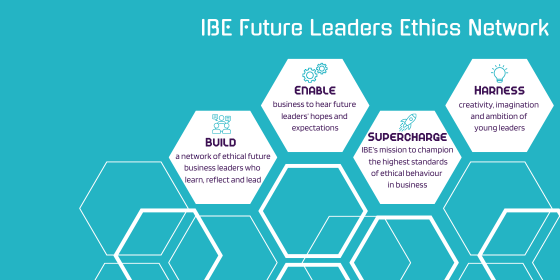Tags: Ethical Values
The IBE Future Leaders Ethics Network is a brand new group, led by future leaders with a commitment to building a more ethical business landscape. On 28th May, a lively group of early career professionals from a wide variety of sectors met for the Network’s launch event. Kindly hosted by Norton Rose Fulbright, the evening was a great opportunity to hear from keynote speaker Jasmine Whitbread and network with like-minded young professionals.
IBE’s Director, Dr Ian Peters, kicked off the event with a welcome, posing the question to everyone in the room: “What does ethical leadership look like to you?”. Following his address, the Chair of the Future Leaders Ethics Network, Lucy Tarran, gave an overview of the Network’s purpose, its work to date and its future plans.
To coincide with the launch, the Network has published guidance: Establishing a Future Leaders Network, aimed at businesses of all different shapes and sizes, to promote innovation and raise the voices of early career professionals. This event was the first of many – the Network aims to run two in-person and two virtual events per year. The Network also has several research strands, which will be producing output on topics ranging from whistleblowing and Speak Up culture, to the ethical implications of emerging technology, to the ethics of corporate sustainability.
Jasmine Whitbread, the evening’s keynote speaker, gave a personal and compelling talk based on her experience of ethical leadership across both the corporate and not-for-profit worlds. Jasmine has served as a director on the boards of BT Group and Standard Chartered and is currently a board member of WPP. Throughout her career to date, she has seen the importance of sustainability and ESG issues skyrocket – and she touched on how it has often been future leaders who have pushed these to the forefront of the business agenda.
In the early stages of her career, Jasmine worked for Thomson, now Thomson Reuters, before making a move out of the corporate world. At the time, she recounted feeling that she needed to find more purpose-driven work and that that seemed to be more readily available in the charitable sector. Nowadays, however, the landscape has changed and purpose-driven, impactful work is equally available in the business world.
Her time in the charity sector saw her work at Oxfam before moving on to lead Save the Children, as both its UK and international CEO. This experience led her to discover that being purpose-driven does not necessarily mean that an organisation is spared from ethical dilemmas.
During her time at Save the Children, the charity faced many ethical dilemmas. An early example was whether it was possible to work in line with humanitarian principles in Zimbabwe, at the time with a government accused of interfering in aid flows. To assure herself of this, her first trip was to visit the programmes there to understand what factors were impacting the project, listening to local management and a range of voices including critics.
Another incident was the decision by Save the Children US to recognise Tony Blair with an award for his humanitarian work, which attracted criticism in the UK and other parts of the world. Jasmine reflected on some key learnings from this time, including the significance of language and tone in internal and external communications, the pressures of competing priorities, and the importance of having a diverse group of advisors.
Jasmine concluded by referencing the IBE’s Guidance for board members on developing an ethical business culture. As a member of the advisory group behind this guidance, she drew on her extensive boardroom experience to pinpoint key areas where future leaders can make a difference in the ethical culture of an organisation. To do so, she emphasised just how important it is for future leaders to get talking to one another – both within and between their organisations.
The evening continued with networking over drinks and nibbles. It was brilliant to see so many people in the room, representing all kinds of sectors and career paths. We hope to see you all again soon, and if you missed out on this event, you can sign up to be kept up to date about the next ones.
Download the guidance...
Author

Emily Ford
Policy Adviser, Chartered Governance Institute
Emily Ford is a Policy Adviser at the Chartered Governance Institute, working with government, regulators and stakeholders to promote good governance.
Her two priority areas are the role of governance in successful ESG strategies across all sectors, and the effective governance of not-for-profit organisations, incorporating the charity and educational sectors. In her role, she conducts and produces research on sector trends, publishes practical guidance for governance professionals, and engages with government on key issues.
She has a background in corporate communications, think tanks and third-sector campaigning. She graduated with an MPhil in International Development from the University of Cambridge and a First-class BA in French and German from King’s College London.

